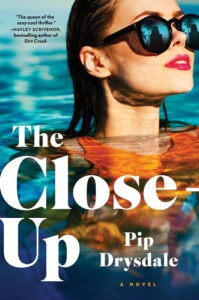One question people always ask when you’ve written a novel is: what inspired it? And if you have any sense, you just tell them. If you’re me, however, you do everything you can not to tell them, everything you can to dodge the question. To speak cryptically and hope nobody notices. Because the truth is that my life inspired my fiction. At least in part.
See, there’s a stalker in my new book, The Close-Up, and thirteen years ago, I was stalked.
Now, you might think I’d jump at the opportunity to tell people about that—who doesn’t want to read a story at least partially inspired by real experience, right? But no. I wasn’t even sure I would be able to write this article. I almost wrote one about the metafictional aspects of The Close-Up instead. Because deep down, I don’t want to be the person who went through what I’m about to tell you. I want to be the unscathed woman who never has bad things happen to her.
But are any of us truly that woman?
Probably not.
I should preface this by saying that The Close-Up isn’t only about a stalker. It’s about the nature of being in the public eye; especially if you are thrust there. About the dark side of fame. About why we’d choose to stay in a situation, even after it gets dangerous. About art. About dreams. About hope. And about how as creatives, we make ourselves supremely vulnerable through making art and sharing it with the world—and why we’d feel the drive to keep doing it. Regardless.
But…back to the stalker. I was a young singer-songwriter living in London, and one night I was going into a party. A man had been talking to me outside (I didn’t want to be impolite) and as I went inside, he grabbed my arm to stop me closing the door on him. I gave him a copy of my CD so he’d have to let me go. But in hindsight, that was my first big mistake: now he knew my name.
It started small, benign. There were random Skype calls and DMs from him talking about my lyrics. I started running into him on my way home from work. I told myself maybe he lived nearby.
Then he started turning up closer to my home. When I saw him, I’d cross the street or try to walk by him. Once he grabbed me and tried to make me dance with him, and when I refused, he said, “If you don’t let me lead you in the dance, how do you know what the marriage will be like?” When I walked away, he angrily spieled off random facts about me, from my middle name to my parents’ postal address to to what I’d said in interviews.
But still, I rationalized the encounters, telling myself that he was weird, but harmless. Nothing to worry about. That if I ignored him, eventually he’d get bored.
Then he started contacting venues where I’d performed, telling them he was my manager. He called on brands, asking them to sponsor me. He blogged about me. His DMs now included poetry and comments on my outfits and suggestions as to what kind of underwear I should wear. Fake social media profiles under my name started popping up. Each time I saw him in person, he’d be lurking closer and closer to my home.
My roommate insisted that I report him to the police, but I demurred—what if they thought I was being melodramatic? Or what if taking action somehow inflamed him? Instead, I changed my routine—altering my routes home and turning down gigs because I didn’t want him to find me.
And while I wanted to stop reading his messages, to block him, it felt like that would be even worse: if I could get a sense of what he was thinking, at least I’d know what was coming next. I knew things were getting bad, but was it go-to-the-police level serious? Surely not.
And then he wrote this to me: I bet you never thought someone would take your lyrics as a call to action.
That was the statement that finally mobilized me to call the police (who did take me seriously—so PSA: it’s always worth reporting something!). And that’s also what inspired The Close-Up.
The protagonist, Zoe Ann Weiss, is a novelist who wrote a thriller about a stalker. When she starts dating a movie star and becomes internet famous, she gets a stalker of her own. A stalker who has clearly read her book, because they start enacting every creepy plot twist from it—and targeting Zoe herself.
In short, the stalker uses her art as a weapon against her.
In my book, I wanted to follow a character’s emotional journey through being a victim of stalking in a way that felt true to me—with all of the illogical choices and feelings and thoughts you might not expect. Because we never really know what we’ll do or feel in a scary situation until we are in the crosshairs ourselves.
Was writing The Close-Up cathartic? Maybe, in a way. It gave me a safe place to explore all the deepest fears I’d been left with. Because the police did what they could to help me, but the stalking continued. And so, not long afterwards, I moved back to Australia—I’d been toying with going home anyway. The vast ocean between us seemed to cause him to stop, but I’ll never know what would have happened if I’d stayed in London. And the experience changed me. I’ve been incredibly careful of what I share on social media or in interviews ever since then. I still find myself feeling anxious every time I appear at a festival or a book signing. And frankly, I’m done with it. I want to live a life that’s full and rich—not one that runs on fear.
So writing The Close-Up was a way to take control of my own narrative again. My experience taught me to trust my gut and to not be so damned worried about appearing melodramatic. To go to the police immediately and make a fuss when there’s a threat. Zoe’s experience is fictional and wildly different from mine, but all her feelings come from real experience. Because as Zoe says: “If you’re not going to tell the absolute truth in fiction, where all truth can be denied, what’s the f*&king point?”
***


















